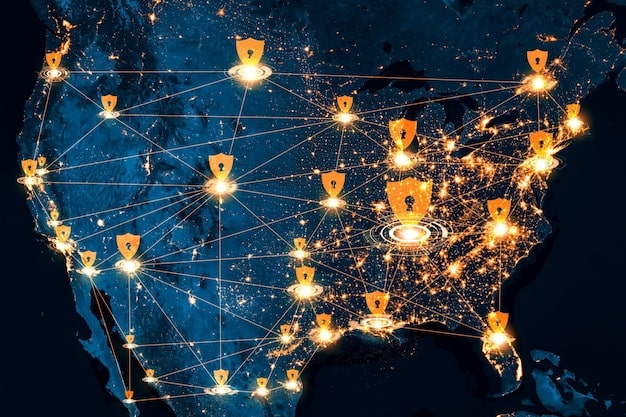Urgent: New Data Privacy Regulations & Online Tracking – What US Consumers Need to Know

Anúncios
The landscape of data privacy and online tracking is rapidly evolving with new regulations designed to give consumers greater control over their personal information and how it’s used by companies, making understanding these changes crucial for every US citizen.
Anúncios
The digital age has brought unprecedented convenience, but also complex challenges, particularly concerning personal data. As new regulations take effect, understanding their implications becomes paramount. This article explores the evolving landscape of Urgent: New Regulations on Data Privacy and Online Tracking – What Consumers Need to Know to navigate their digital lives safely and with greater awareness.
The Shifting Sands of Data Privacy Legislation
In an increasingly connected world, personal data has become a valuable commodity. From browsing habits to purchasing patterns, every digital interaction leaves a trace. This extensive data collection has, however, raised significant concerns about privacy and potential misuse. Governments worldwide, including in the US, are responding with new legislative frameworks designed to protect consumers.
The push for stricter data privacy laws stems from a growing awareness among the public regarding their digital rights. High-profile data breaches and controversies surrounding how companies handle personal information have fueled this demand for greater transparency and control. These new regulations aim to empower individuals, giving them more say over their digital footprint.
Anúncios
Understanding the Core Principles of New Regulations
At the heart of these emerging regulations are several key principles focused on consumer rights and corporate accountability. They typically mandate that companies be more transparent about their data collection practices, obtain explicit consent from users, and provide mechanisms for individuals to access, correct, or delete their personal data.
- Transparency: Consumers must be clearly informed about what data is being collected and why.
- Consent: Explicit and informed consent is often required before data can be processed.
- Access and Control: Individuals gain rights to view their data, rectify inaccuracies, and request deletion.
- Accountability: Companies are held responsible for safeguarding data and complying with regulations.
These principles seek to shift the power dynamic from corporations to consumers, ensuring that personal data is treated with the respect and security it deserves. The transition will require significant adjustments for businesses but ultimately foster a more trustworthy digital environment for everyone.
The impact extends beyond individual users to the broader economy. Businesses failing to adapt to these new standards face substantial penalties, while those that embrace privacy-by-design can build stronger trust with their customer base. This legislative wave is fundamentally reshaping how data is perceived and managed, moving it from a wild west to a more regulated, rights-based frontier.
Online Tracking: The Intricacies and New Restrictions
Online tracking, often invisible to the user, is fundamental to the digital advertising ecosystem. It involves various technologies, such as cookies, pixels, and device fingerprinting, used to monitor user behavior across websites and applications. The data gathered helps companies deliver targeted advertisements, personalize experiences, and analyze user engagement.
While tracking can offer benefits, such as tailored content and relevant ads, it also raises privacy concerns. Consumers often feel their every move online is being watched without their full understanding or consent. The opaque nature of many tracking practices has led to a demand for greater oversight and regulation.
How Regulations Are Targeting Tracking Technologies
New data privacy regulations are specifically addressing online tracking by requiring more transparency and control. This includes mandates for clearer cookie consent banners, the right for users to opt out of certain tracking activities, and stricter rules around the sharing of data with third parties. The goal is to move away from implied consent towards explicit, informed choices.
- Enhanced Consent: Moving beyond simple “OK” buttons to offer granular choices for different types of cookies and tracking.
- Opt-Out Mechanisms: Providing easily accessible methods for users to refuse tracking or withdraw consent at any time.
- Restrictions on Cross-Site Tracking: Imposing limits on how data collected on one site can be combined with data from others.
These measures aim to reduce the pervasive, often surreptitious, collection of personal data for advertising purposes. Companies are being pushed to innovate advertising methods that respect user privacy, rather than relying on extensive tracking. This may lead to shifts in the digital marketing industry, favoring contextual advertising over behavioral targeting.
The enforcement of these new rules means that websites and apps must reconsider their data collection strategies. A failure to comply can result in significant fines and reputational damage. For consumers, this translates into a more secure browsing experience, where their online activities are less likely to be covertly monitored and monetized without their explicit permission.
Key Rights Consumers Now Possess
A cornerstone of new data privacy regulations is the empowerment of consumers through defined rights concerning their personal data. These rights are designed to give individuals tangible control over how their information is collected, used, and stored by organizations. Understanding these rights is crucial for consumers to effectively advocate for their privacy.
Historically, the power imbalance favored businesses, which often collected vast amounts of data with little oversight. New regulations seek to recalibrate this dynamic, placing the individual at the center of data governance. This means that merely having a privacy policy is no longer sufficient; companies must actively facilitate the exercise of these rights.
Exercising Your Rights: What You Can Do
Knowing your rights is the first step; exercising them is the next. Consumers can now take proactive measures to manage their digital privacy. This might involve requesting access to their data, asking for corrections, or demanding that their data be deleted from a company’s records. Companies are obligated to respond to these requests within a defined timeframe.
- Right to Access: Request a copy of all personal data a company holds about you.
- Right to Rectification: Ask for incorrect or incomplete data to be corrected.
- Right to Erasure (Right to Be Forgotten): Request the deletion of your personal data under certain conditions.
- Right to Restrict Processing: Limit how a company uses your data, even if it cannot be deleted.
These rights are not absolute, and certain legal exceptions may apply. However, they provide a strong framework for individuals to demand accountability from data collectors. Many companies are now updating their privacy dashboards and customer service portals to make it easier for users to submit these requests, reflecting a shift towards more user-friendly compliance.

Furthermore, these regulations often grant individuals the right to object to certain types of data processing, particularly those related to direct marketing or automated decision-making. This empowers consumers to opt out of practices they deem invasive or unfair, compelling businesses to adopt more ethical approaches to data utilization. Understanding and exercising these rights is key to navigating the future of digital privacy.
Impact on Businesses: Compliance Challenges and Opportunities
The implementation of new data privacy regulations presents a complex challenge for businesses of all sizes, from tech giants to small online retailers. Compliance is not merely a legal obligation but requires a fundamental shift in how organizations perceive and manage data. The consequences of non-compliance can be severe, including hefty fines, reputational damage, and loss of consumer trust.
Companies are now compelled to undertake comprehensive audits of their data handling practices, identify potential risks, and implement robust safeguards. This often involves significant investment in technology, processes, and employee training. The journey to full compliance can be arduous, but it also presents opportunities for businesses to differentiate themselves.
Navigating the Compliance Landscape
Achieving compliance typically involves several key steps. Businesses must first map their data flows, understanding where personal data is collected, stored, processed, and shared. This data mapping exercise helps identify gaps and areas that require attention. Subsequently, robust data governance frameworks need to be established, encompassing policies, procedures, and clear roles and responsibilities.
- Data Mapping: Understanding the lifecycle of data within the organization.
- Consent Management: Implementing systems to obtain, record, and manage user consent.
- Data Security: Enhancing cybersecurity measures to protect personal data from breaches.
- Employee Training: Educating staff on data privacy principles and compliance obligations.
Beyond the operational adjustments, there’s a cultural shift required. Privacy-by-design, where privacy considerations are integrated into the development of products and services from the outset, is becoming a standard best practice. This proactive approach helps embed privacy into the core of business operations, rather than treating it as an afterthought.
While the initial investment in compliance can be substantial, businesses that successfully navigate this landscape can turn it into a competitive advantage. Demonstrating a strong commitment to privacy can enhance brand reputation, foster greater customer loyalty, and ultimately drive sustainable growth. Trust, in the digital economy, is a critical currency.
Geographic Nuances: US vs. Global Regulations
While the European Union’s General Data Protection Regulation (GDPR) often sets the global benchmark for data privacy, the United States takes a more fragmented, sector-specific approach. This creates a complex patchwork of laws that can be challenging for both consumers and businesses to navigate. Understanding these nuances is essential.
Unlike a single federal privacy law, the US relies on a combination of state-level statutes, industry-specific regulations, and common law principles. This includes landmark legislation like the California Consumer Privacy Act (CCPA) and its successor, the California Privacy Rights Act (CPRA), which have significant implications for businesses operating nationwide.
Key US State Laws and Their Distinctions
Several US states have enacted their own comprehensive data privacy laws, each with unique provisions. While many share common themes with GDPR, such as rights to access and deletion, they differ in scope, enforcement mechanisms, and specific definitions of “personal information.”
- California Consumer Privacy Act (CCPA/CPRA): Grants consumers rights over personal information collected by businesses, including the right to know, delete, and opt-out of sales.
- Virginia Consumer Data Protection Act (VCDPA): Focuses on consumer rights including access, deletion, and opt-out of targeted advertising and sales.
- Colorado Privacy Act (CPA): Similar to VCDPA, emphasizes data protection assessments and universal opt-out mechanisms.
- Utah Consumer Privacy Act (UCPA): Provides consumers with rights to access, delete, and opt-out of data sales, with a business-friendly enforcement framework.
This evolving landscape means that a business operating across state lines might need to comply with multiple, sometimes conflicting, sets of regulations. The absence of a unified federal law often leads to calls for a national standard that could simplify compliance and provide consistent protections for all US consumers.

For consumers, this means their data privacy rights can vary depending on their state of residence. While this fragmentation provides tailored protections in some areas, it also creates an uneven playing field. The ongoing legislative activity at both state and federal levels indicates a growing commitment to strengthening data privacy, though the path to a harmonious framework remains complex.
Preparing for the Future: What Consumers Should Do Now
The pace of change in data privacy is relentless. While new regulations offer enhanced protections, consumers play a vital role in safeguarding their own digital footprint. Proactive measures, coupled with an informed understanding of changing norms, are essential for maintaining personal privacy in the digital age.
Relying solely on regulations is insufficient; personal vigilance and responsible online habits are equally important. As companies adapt to new legal requirements, consumers too must evolve their approach to how they share and manage their personal information online. This involves a shift from passive acceptance to active participation in global digital protection systems.
Practical Steps for Enhanced Privacy
Empowering yourself with knowledge and implementing practical steps can significantly enhance your online privacy. This includes regularly reviewing privacy settings on social media and other online services, using strong, unique passwords, and being cautious about what information is shared publically.
- Review Privacy Settings: Regularly check and adjust privacy settings on all online accounts (social media, apps, etc.).
- Understand Cookie Consent: Don’t just click “Accept All”; take time to understand cookie options and customize preferences.
- Use Privacy-Enhancing Tools: Consider browser extensions that block trackers or use privacy-focused search engines.
- Be Skeptical of Requests: Question why a website or app needs certain personal information before providing it.
- Practice Data Minimization: Share only the necessary information to achieve your online goal.
- Stay Informed: Keep up-to-date with new data privacy laws and cybersecurity best practices.
Educating oneself about common digital threats, such as phishing scams and identity theft, is also critical. These threats often exploit gaps in personal awareness rather than solely relying on technical vulnerabilities. A well-informed consumer is the first line of defense against privacy breaches and fraudulent activities.
Ultimately, the future of data privacy relies on a collaborative effort between regulators, businesses, and individuals. While regulations establish the framework, consumer demand and informed choices will drive continuous improvement. By taking proactive steps and staying informed, consumers can play a significant role in shaping a more private and secure digital world for themselves and future generations.
| Key Area | Consumer Impact |
|---|---|
| 🛡️ Data Control | You gain more rights to access, correct, and delete your personal data held by companies. |
| 🍪 Online Tracking | Stricter rules on cookies and tracking, requiring explicit consent and easier opt-out options. |
| ⚖️ Business Accountability | Companies face higher penalties for non-compliance, pushing them towards better data handling practices. |
| 🌍 Varied US Laws | Data privacy rights may differ based on your US state of residence, due to fragmented state laws. |
Frequently Asked Questions About Data Privacy Regulations
For you, data privacy means having control over how your personal information (like your name, email, browsing habits) is collected, used, and shared by companies. New regulations aim to give you stronger rights by requiring transparency, consent, and the ability to access or delete your data.
While often inspired by GDPR, US regulations like CCPA/CPRA are typically state-specific rather than federal. Yes, they directly affect US consumers by granting new rights, especially in states like California, Virginia, and Colorado. These laws apply to many businesses operating within or serving residents of those states.
Look for clear, prominent cookie consent banners that allow you to customize your preferences, rather than just clicking “accept all.” Websites should also provide easy-to-find privacy policies explaining their data practices and offering an opt-out mechanism for data sales or targeted advertising.
The “right to erasure” allows you to request that companies delete your personal data they hold, under certain conditions. You typically exercise this by submitting a request through the company’s designated privacy portal, email, or a phone number provided in their privacy policy. The company is then usually obligated to respond within a specific timeframe.
While primarily focused on privacy rights, these regulations often mandate stronger data security measures from companies, which can indirectly reduce the risk of breaches. However, no system is entirely breach-proof. Personal vigilance, like using strong passwords, remains your essential first line of defense online.
Conclusion
The wave of new regulations on data privacy and online tracking marks a pivotal moment for consumers, shifting the balance of power and fostering a more accountable digital environment. Understanding these changes, from the fundamental rights granted to the nuances of state-level laws, is no longer optional but essential for every digitally engaged individual. While businesses navigate complex compliance landscapes, consumers are empowered with unprecedented tools to manage their digital footprint. By embracing vigilance and utilizing their newfound rights, consumers can actively shape a more private, secure, and trustworthy online future.





